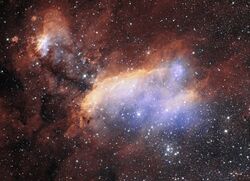Astronomy:Prawn Nebula
From HandWiki
Coordinates: ![]() 16h 56m 54.66861s, −40° 30′ 44.4441″
16h 56m 54.66861s, −40° 30′ 44.4441″
Short description: Emission nebula in the constellation Scorpius
| Emission nebula | |
|---|---|
| H II region | |
 Detailed view of the Prawn Nebula Credit: ESO | |
| Observation data: J2000 epoch | |
| Right ascension | 16h 56m 54.66861s[1] |
| Declination | −40° 30′ 44.4441″[1] |
| Distance | 6,000[2] ly |
| Apparent magnitude (V) | +7.31[1] |
| Apparent dimensions (V) | 90' |
| Constellation | Scorpius |
| Physical characteristics | |
| Radius | 125[3] ly |
| Designations | HD 152723, CSI-40 10986 21, Hbg 1258, SAO 227479, ALS 3854, CSV 102812, HIC 82936, SKY# 30546, CD-40 10986, GC 22819, HIP 82936, TD1 19710, CEL 4464, GCRV 9755, IC 4628, UBV 14329, CGO 429, GEN# +1.00152723J, LS 3854, uvby98 100152723 ABC, Cl Trumpler 24 405, GOS G344.81+01.61 01, MCW 1270, CPC 0 15594, GSC 07872-02169, NSV 8060, CPD-40 7650, GUM 56, PPM 322447 |
Prawn Nebula, also known as IC 4628, is an emission nebula located in the Sagittarius Arm of the Milky Way, around 6,000 light-years from Earth in the constellation Scorpius. It forms part of the tail of the "False Comet" anchored by the bright open cluster NGC 6231.
Gallery
-
The Prawn Nebula in close-up.[3]
References
- ↑ 1.0 1.1 1.2 "SIMBAD Astronomical Database". Results for IC 4628. http://simbad.u-strasbg.fr/Simbad. Retrieved 2013-09-19.
- ↑ "Young Stars Cooking in the Prawn Nebula". ESO Press Release. http://www.eso.org/public/news/eso1340/. Retrieved 20 September 2013.
- ↑ 3.0 3.1 "Cosmic Recycling". http://www.eso.org/public/news/eso1535/. Retrieved 2 September 2015.
External links
 |
![The Prawn Nebula in close-up.[3]](/wiki/images/thumb/b/ba/The_Prawn_Nebula_in_close-up.jpg/120px-The_Prawn_Nebula_in_close-up.jpg)
